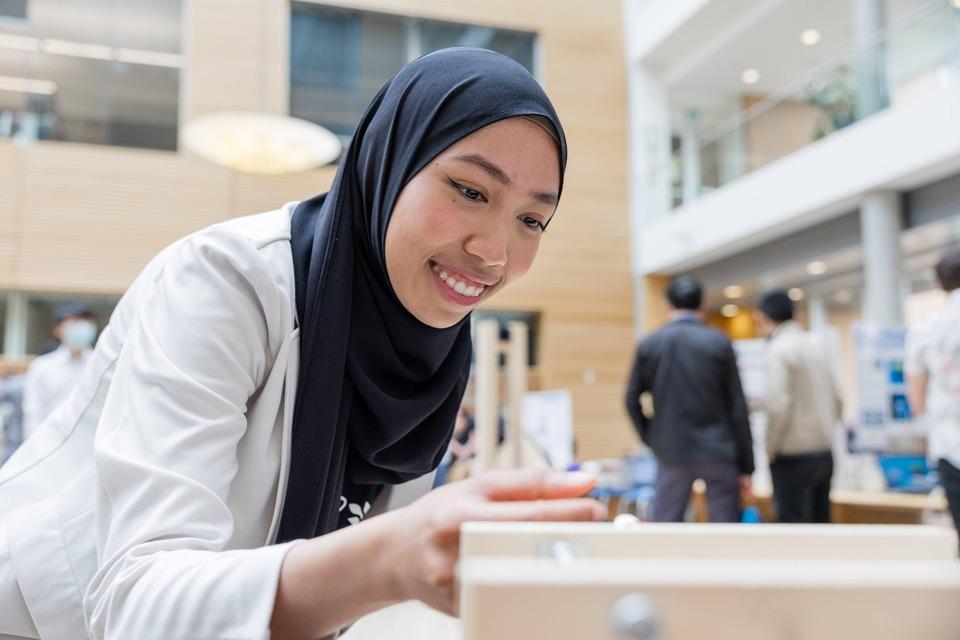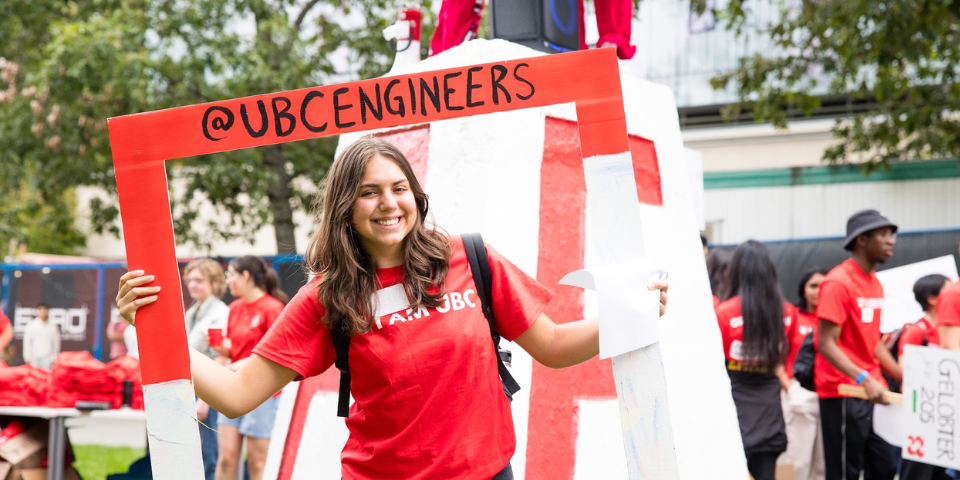
Computer engineers can change the world. Whether it is the systems that control our phones, cars, planes or robots — every automated device has a software or hardware engineer helping to create it.
As a student in UBC’s Computer Engineering program, you will learn how to develop, design and test software, computer networks, and protocols.
After your first year, you will have the opportunity to bring your classroom learning to life in a Design Studio course. In your fourth year, you will have the option to collaborate with industry partners in a team-based Capstone project, or create your own business plan and prototype in the New Venture Design course. Don’t miss your chance to engineer your successful future — in real time.
Okanagan Campus
Learn more at the Okanagan You UBC's program page or visit us at engineering.ok.ubc.ca
Learn more about Computer Engineering (Okanagan)
Vancouver Campus
Learn more at You UBC's program page or visit us at ece.ubc.ca
Why Study This Program
Computer Engineering graduates are well positioned to start successful careers in a variety of different industries. Common areas of focus they can pursue include: software, biomedical, robotics, operating systems, energy systems.
Courses & Specializations
Students will first complete a foundational first year of engineering and then take specialized courses beginning in second year, once they are placed into their engineering discipline. Here is a sample of the courses Computer Engineering students can take in each year of study.
| Year 2 | |
|---|---|
| CPEN 211 | Computing Systems I |
| CPEN 221 | Software Construction I |
| CPEN 281 | Technical Communication |
| ELEC 201 | Circuit Analysis I |
| Year 3 | |
|---|---|
| CPEN 331 | Operating Systems |
| CPEN 391 | Computer Engineering Design Studio II |
| CPSC 320 | Intermediate Algorithm Design and Analysis |
| Year 4 | |
|---|---|
| APSC 450 | Professional Engineering Practice |
| CPEN 481 | Economic Analysis of Engineering Projects |
| CPEN 491 | Computer Engineering Capstone Design Project |
For a more in-depth look at the Computer Engineering curriculum, please consult the Computer Engineering Program website.
Enhance Your Education (further education)
Graduates of the Computer Engineering program looking to continue their education can pursue professional programs and graduate studies. The analytical and problem-solving skills students gain from an undergraduate engineering degree translate well into the qualities needed for Medical and Law School. These students also make strong candidates for UBC’s Master of Engineering Leadership in Dependable Software Systems which offers the unique combination of business and engineering courses for students looking to further their studies and gain the relevant skills to design and maintain reliable software systems.
Careers
With a mean base salary of $108,117 (source) and an expected employment growth rate of 1.2% over the next 5 years (source), graduates of Computer Engineering are well equipped to pursue careers in computer and telecommunication hardware manufacturers, manufacturing and telecommunications firms, information technology consulting firms, government, educational and research institutions, information technology units, and the health industry (source). Common career titles (source) for Computer Engineering graduates include: capacity planning analyst, computer systems engineer, hardware design engineer, optical systems engineer, radio systems engineer, telecommunications engineer, spacecraft electronics engineer, data communications specialist.
Employers
Both current students and graduates are able to work for a wide range of employers. Some of the biggest employers of UBC Computer Engineering students over the past several years include: Visier, Hootsuite, Intel Corporation, and SAP.
Alumni
Design Teams & Clubs
Design Teams
There are over 30 Engineering Design Teams at UBC. Joining an engineering design team is an excellent opportunity for students from all disciplines to collaborate on a wide variety of design projects and gain relevant teamwork, leadership, and technical skills transferrable to future careers. Some of the design teams related to Computer Engineering include:
Learn more about UBC’s Engineering Design Teams
Clubs
There are many ways engineering students can get involved, including joining clubs relevant to their discipline. Clubs relevant to Computer Engineering include:
Research
Undergraduate students can get involved with research where they have the opportunity to participate in research projects being conducted in the Electrical and Computer Engineering labs. Topics of research within the department include:
- Biomedical Technologies
- Work in this group spans the wide range from microscale tools for basic science and drug discovery to bedside applications in the clinic. Their interdisciplinary research projects include microsystems for single-cell manipulation, photonics for imaging of tissue samples, signal processing for medical imaging, and medical instrumentation and robotics. Strong interaction with the Faculty of Medicine, the International Collaboration on Repair Discoveries (ICORD), the BC Cancer Research Agency, the biomedical device industry, and other many collaborations drives our technology development to address challenges in biomedical engineering.
- Work in this group spans the wide range from microscale tools for basic science and drug discovery to bedside applications in the clinic. Their interdisciplinary research projects include microsystems for single-cell manipulation, photonics for imaging of tissue samples, signal processing for medical imaging, and medical instrumentation and robotics. Strong interaction with the Faculty of Medicine, the International Collaboration on Repair Discoveries (ICORD), the BC Cancer Research Agency, the biomedical device industry, and other many collaborations drives our technology development to address challenges in biomedical engineering.
- Communication Systems
- Work in this group spans various areas including coding, relaying, channel modelling, statistical signal processing, multiple access, scheduling, routing, multimedia, image processing, target tracking, optical transceiver, sensors, antenna, as well as distributed security design. They collaborate with companies, academic institutions and government agencies in British Columbia, Canada and around the world on joint projects.
- Work in this group spans various areas including coding, relaying, channel modelling, statistical signal processing, multiple access, scheduling, routing, multimedia, image processing, target tracking, optical transceiver, sensors, antenna, as well as distributed security design. They collaborate with companies, academic institutions and government agencies in British Columbia, Canada and around the world on joint projects.
- Computer and Software Systems
- Researchers in the computer engineering area are working on a range of techniques cutting across hardware and software layers in computer systems. We are focused on high-performance, adaptable, dependable, secure and predictable computer systems. Our innovation is driven by the realization that the user is the ultimate arbiter in a computer system, and hence we actively involve users in improving the techniques we build. Our unique emphasis on a cross-layer approach allows us to achieve unprecedented levels of performance and usability.
- Researchers in the computer engineering area are working on a range of techniques cutting across hardware and software layers in computer systems. We are focused on high-performance, adaptable, dependable, secure and predictable computer systems. Our innovation is driven by the realization that the user is the ultimate arbiter in a computer system, and hence we actively involve users in improving the techniques we build. Our unique emphasis on a cross-layer approach allows us to achieve unprecedented levels of performance and usability.
- Emerging Micro/Nano Technologies
- With a strong emphasis on experimentation and fabrication, the applications will span the areas of biomedical devices, nano-computing, nano-devices, energy, optical communications, sensors and actuators. Their dedicated team of visionary and exploratory researchers working together on multidisciplinary problems creates a unique advantage for the ECE; Students will be engaged in theory and practice, studying the core engineering curriculum, as well as courses in nano and micro technologies.
- With a strong emphasis on experimentation and fabrication, the applications will span the areas of biomedical devices, nano-computing, nano-devices, energy, optical communications, sensors and actuators. Their dedicated team of visionary and exploratory researchers working together on multidisciplinary problems creates a unique advantage for the ECE; Students will be engaged in theory and practice, studying the core engineering curriculum, as well as courses in nano and micro technologies.
- Energy Systems
- The generation, transmission, distribution and processing of electrical energy, including renewable and sustainable energy sources and their integration within the modern electrical grid and community. Using applications such as the protection and reliable operation of the grid, electromechanical actuators, electric propulsion, electrical power systems of vehicles, aircraft and ships, we aim to have students gain experience through theoretical and practical training, for the continued management of increased electrical load demand. Utilizing innovative research to minimize such demand and the future impact of increased demand, students will develop a focus on alternative energy sources, better grid management, and will learn project-and-problem based applications.
- The generation, transmission, distribution and processing of electrical energy, including renewable and sustainable energy sources and their integration within the modern electrical grid and community. Using applications such as the protection and reliable operation of the grid, electromechanical actuators, electric propulsion, electrical power systems of vehicles, aircraft and ships, we aim to have students gain experience through theoretical and practical training, for the continued management of increased electrical load demand. Utilizing innovative research to minimize such demand and the future impact of increased demand, students will develop a focus on alternative energy sources, better grid management, and will learn project-and-problem based applications.
- Optimization, Learning, Control
- We approach engineering and societal problems brought to our attention from industry or applied sectors by focusing on their mathematical underpinnings. We find that abstracting the problems to their core challenges is the first step to gaining the clarity needed to solve them. Bringing together insights, techniques, and expertise from optimization, statistics, learning, signal-processing and control, we develop theoretical frameworks and algorithmic solutions. We verify and apply our findings through partnerships with industry, healthcare and government.
Minors & Dual Degrees
Engineering students are able to complement their studies with 5 Minors available or a Dual Degree with Arts. Students interested in a minor can apply to their chosen option in their third year of study. A minor or dual degree will likely extend your degree past 4 years.
Co-op
Participation in the Engineering Co-op Education program gives students the opportunity to gain up to 20 months of paid relevant work experience during their degree. This experience provides an excellent opportunity for students to explore different industries, apply their studies to the working world, and create connections with future employers. The Co-op program will extend your four year degree to five years. Participation is optional and students apply to join Co-op in their second year of study.
International Experiences
Students can embark on an unforgettable experience abroad while earning credits towards their engineering studies. Opportunities include the Coordinated International Experience (CIE) exchange program and the Go Global exchange program. The CIE program is customized for Applied Science students and features 17 international partner institutions across 3 continents. All of the international experiences allow students to build an international network of peers, professors, and potential employers.













